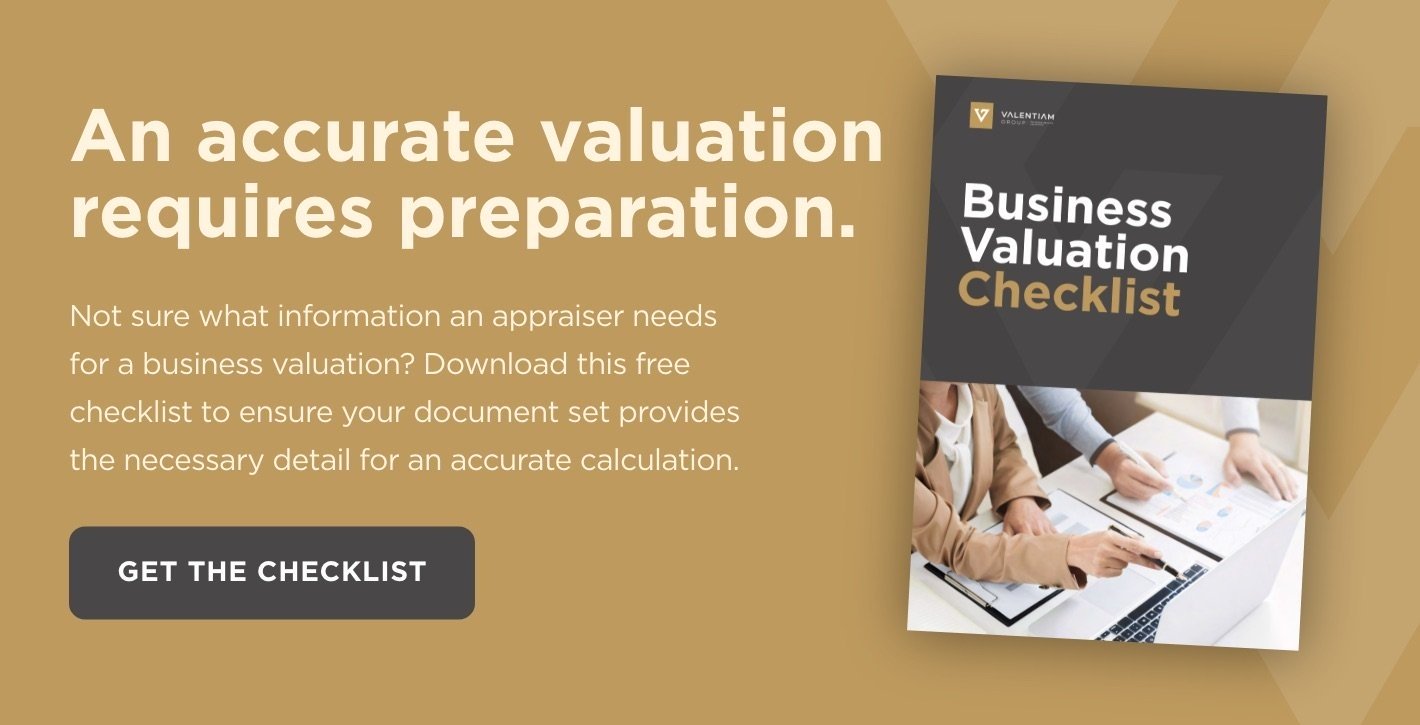Business Valuation Factors: The Top 9 Things To Consider
Posted by Valentiam Group on November 19, 2020

What are the factors to consider when valuing a business?
In a previous article about the process of compiling a business appraisal, we noted that different factors are important in each of the three main valuation approaches—the market, income, and cost methods of valuation. But while there are a number of business valuation factors that can come into play, it’s important to recognize that not all of the factors affecting valuation are important in all cases.
In this article, we’ll examine various valuation factors and explain which factors are most important for different valuation scenarios.
Purpose: The Most Important Business Valuation Factor
Although it’s not traditionally recognized as a valuation factor, the most important determinant for any valuation is its purpose. In the factors that lead to a valuation of the company’s worth, the purpose of the valuation is the most important.
That’s because the purpose of the valuation establishes the premise of value. That value can differ if, for example, the purpose is investment in a stock rather than the sale of a business. Different purposes for valuation provide you with a guide for which business valuation factors will provide the most accurate estimate of value.
As an example, consider a valuation for an auto manufacturer. The most important business valuation factors will vary depending on what is being valued: the business enterprise, intellectual property (e.g. research and development), or its tangible assets, such as a manufacturing plant. If the focus is on the manufacturing plant itself, a ratio of analysis of earnings before interest, taxes, depreciation, and amortization (EBITDA) or revenue would need to be compared to a plant in a similar situation. The proper information can be difficult to obtain and a more reliable valuation factor would be the cost to replace or rebuild the plant itself.
Valuation experts think about valuation from a different perspective depending on its purpose. The broadest valuation can be thought of as a big box that contains smaller boxes that fit inside of it. This big box is the business enterprise—which includes smaller boxes of tangible and intangible assets, and the present value of future growth opportunities. The smaller boxes can also contain boxes which are smaller yet, which can be as small as individual physical assets, intellectual property (IP), or other intangible assets.
If the purpose is the sale of the business, certain parts of the business, or certain assets, the valuation expert will have different tools at his or her disposal. The purpose can change if the business is being sold to a third party or if a minority or majority shareholder decides to sell their shares in the company. In a private company, there will be variation in the value of a minority share vs. a majority share. The specifics of the case and the specifics of the parts of the business matter. What you look at and how you value it will depend on the purpose of the valuation and the factors that affect valuation for that purpose.
The next section focuses on the various factors to consider when valuing a business, and the cases where each is applicable.
Preparing for a business valuation? Download our free Business Valuation Checklist to learn what information you’ll need to have to calculate an accurate value.
Factors That Lead To A Valuation Of A Company’s Worth
Once the purpose for the valuation is understood, the various business valuation factors that are important for the specific case will be apparent. The following are the nine factors to consider when valuing a business. Depending on the purpose of the valuation, one or more of these factors may be immaterial:
- EBITDA: The calculation of a company’s value based on earnings before interest, taxes, depreciation, and amortization functions as a stand-in for the company’s enterprise value. This value eliminates the non-operating effects unique to each business and measures its financial performance. EBITDA values include common shares and equity, short-term and long-term debts, minority interest, and preferred equity. The company’s EBITDA is an important factor in cases involving the purchase or sale of the business (in part or whole) or in a stock investment, as it is a measure of company profitability. EBITDA is inconsequential in tax situations or cases where tangible or intangible assets are being sold or purchased.
- Size: The size of the company has an impact on value and is one factor in determining its EBITDA multiple. Company size matters in the purchase or sale of the enterprise, an operating unit of the company, or stock. It is not useful in figuring value for tax purposes or for the sale or purchase of assets (other than complete operating units).
- Revenue trends: The company’s revenue trends will be of interest to potential investors or prospective purchasers, but again, are immaterial for tax purposes or for the sale of physical assets. Revenue trends might be important when valuing IP, depending on the specific situation.
- Growth prospects: The company’s prospects for future growth are of great interest to investors or potential purchasers, but immaterial for tax purposes or the current value of assets.
- Earning history: Again, earning history will be of interest to investors or potential buyers, but is of no value for appraisals conducted for tax purposes or valuing assets.
- Location: The location of the company or its assets may affect its enterprise value or the value of various assets, but in most cases, it will be of most interest for tax purposes, since different jurisdictions have different tax rates.
- Staff and management: The value of staff and management will be of importance only in the valuation of going concerns; for businesses in liquidation, the value of this intangible is immaterial. Therefore, as a business valuation factor, staff and management are only of value in investment or purchase/sale contexts.
- Reputation: Another intangible asset that only has value in a going concern context is reputation. The reputation of the business (if it is good) will have value to investors or potential buyers.
- Competitive advantages: The value of a company’s competitive advantages is important primarily in the context of investment or purchase/sale of the business. It may also come into play if the valuation is for the purpose of the sale of certain tangible assets or IP, insofar as those assets confer competitive advantage. For example, a business location in a high-traffic area may give the company a competitive advantage; this location will be of greater value in a sale than a business location in a lower-traffic area. The same holds true for valuable intellectual property when it constitutes the primary competitive advantage of the business.
As illustrated, the purpose of the valuation will determine the importance of each of the business valuation factors listed above. In business appraisal, purpose will always be the starting point in determining not only the valuation approach or approaches to use, but also how important each of these business valuation factors are in the valuation process. Professional business valuation specialists, like the team at Valentiam, will always begin by establishing the purpose of appraisal in order to determine the valuation methods and factors of greatest importance.
Need help determining the value of your business?
Valentiam has helped companies in a variety of industries attain accurate enterprise and asset valuations. We have extensive experience in the application of all valuation methods for a broad range of businesses and situations. Our valuation and transfer pricing specialists have worked with some of the largest companies in the world.
Contact us to see how we can help your company with your valuation and transfer pricing needs.
Topics: Business valuation
Related Posts
EBITDA Multiples By Industry: An Analysis
EBITDA multiples by industry indicate growth, profitability, and stability of profits in various sectors—and are a quick and easy way to estimate value.
Valuation Methods: A Guide
Different types of business valuation methods are suited to specific needs. Here are the three primary types of valuation techniques and when they should be used.


